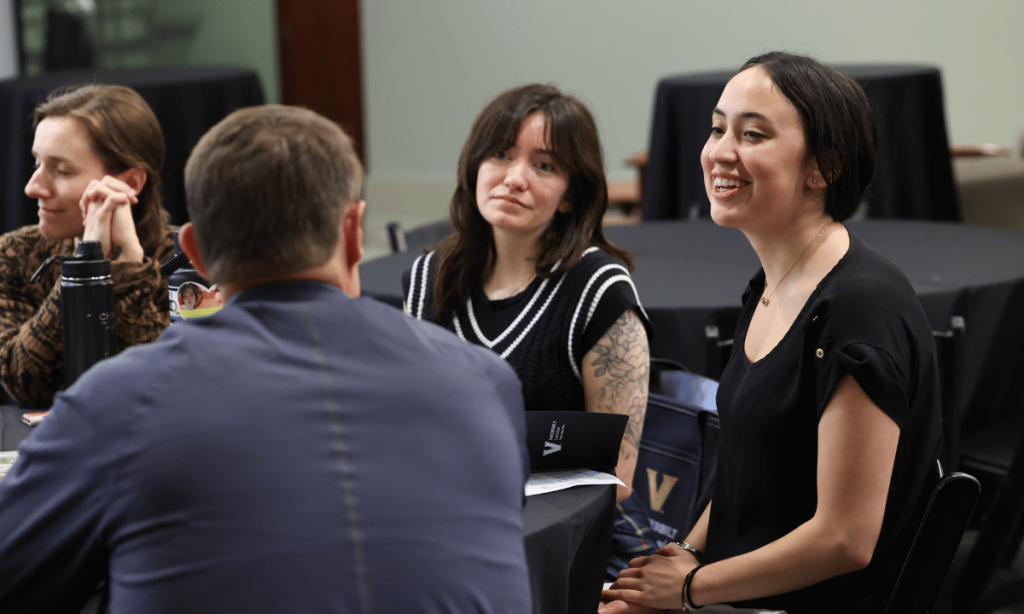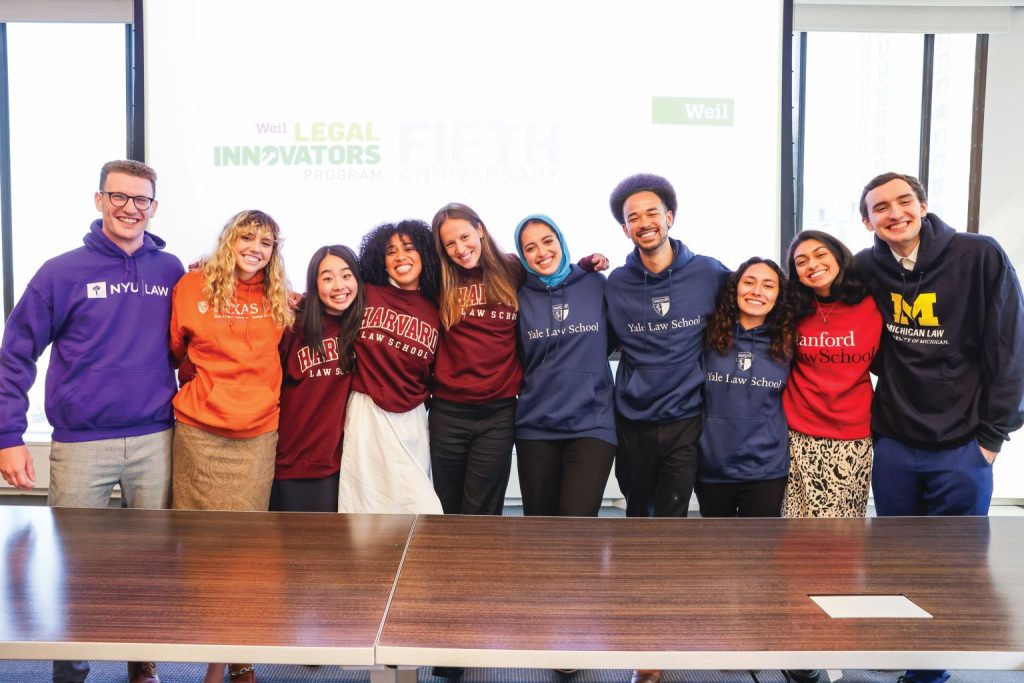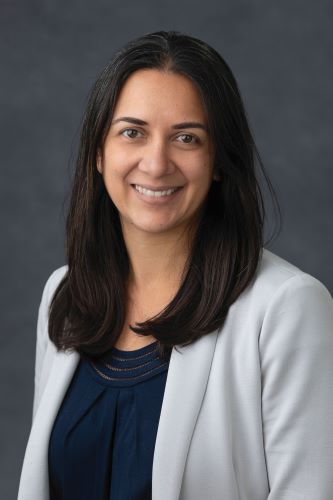A career in public service begins in law school by taking relevant courses and developing a network to fuel your pipeline of possibilities.
Lady Justice may wear a blindfold, but she’s not blind.
As a symbol of fairness and equity, Lady Justice embodies the ideals at the heart of the legal profession. With a blindfold, scales and a sword, she represents the impartiality, balance and authority required to uphold justice.
Her blindfold represents the need for objectivity, for decisions without bias or prejudice. The scales signify the careful weighing of evidence to achieve fairness, while the sword shows the law’s power to enforce accountability and protect the vulnerable.
For those pursuing a career in public service, Lady Justice represents a call to action. Public service lawyers bring her principles to life by advocating for marginalized communities, ensuring access to legal representation and working to dismantle systemic inequities. Whether representing tenants facing eviction or individuals navigating the criminal justice system, public service lawyers are the living embodiment of Lady Justice’s mission to deliver fairness and compassion.
Practicing law in public service is more than a career; it’s a commitment to upholding the rule of law and advancing social good.
Just as Lady Justice’s image has inspired centuries of legal tradition, the work of public service lawyers continues to shape a more equitable and inclusive society.
By stepping into this role, lawyers fulfill not only the ideals of the profession but also the promise of justice for all.
What is public service
Public service law encompasses a broad range of roles and practice areas.
It includes positions in federal, state or local government, such as prosecutors, public defenders, legislative advisers and attorneys for regulatory agencies. These roles focus on upholding laws and ensuring equitable enforcement.
Public service jobs in legal aid and nonprofit advocacy provide assistance to individuals and groups who cannot afford private legal representation. This can involve working for nonprofit organizations focused on issues such as housing rights, immigration, domestic violence or disability advocacy.
Another area of public service focuses on legislative and policy work to bring about systemic changes in areas such as criminal justice reform, health care access, environmental protection and civil rights.
Beth Cruz, assistant dean at Vanderbilt University Law School, said public interest law is distinct in that it focuses on the common good, making it vital for ensuring access to justice no matter a person’s status, wealth or power.
“Lawyering in public service or public interest is driven by a commitment to uphold fairness, equality and the rule of law in ways that benefit communities and individuals in need,” she said. “It’s a mission-driven practice that law students feel led to pursue.”
Cruz received her J.D. from Vanderbilt in 2010. Before she returned as a faculty member, she founded and led the Education Rights Project at the Nashville Defenders Office, focusing on disrupting the school-to-prison pipeline by providing legal help, advocating for policy changes and educating community members. For 13 years, she represented low-income clients in cases involving education, juvenile justice and child welfare.
This background is a plus, as she provides leadership, support and specialized advising for public interest students.
“I emphasize to students the value of knowing their ‘why’ for pursuing a career in law, especially in public interest,” Cruz said. “A forward-looking mindset to map their path to practicing law for the greater good is essential to being happy with their careers.”
Law school essentials
Vanderbilt started a bootcamp this past fall based on feedback from alumni and students about some of the pain points public interest students encounter.
“In the first year of law school, students are receiving a lot of information about how to apply to corporate firms, but information about public interest hiring may be less readily available,” Cruz said. “The bootcamp covered preparation for fellowships and advanced interviewing and held a panel discussion with public service employers about salary, types of jobs available, quality of life and challenges about practicing law.”

Cruz said it’s not uncommon for 3Ls interested in public service jobs to still be looking for employment during their second semester. She urges them to stay the course, remember why they came to law school and be prepared to pursue opportunities as they arise.
“From day one, a public interest lawyer’s work is out in the world. You’re representing clients; you’re hitting the ground running,” she said. “It’s critical that students have exposure to practical training and learn as many lawyering skills as possible.”
Vanderbilt hosts community conversations every month for students to network and develop a community.
“This gives students the opportunity to encourage one another and build relationships down the line,” Cruz said. “A lot of the synergy and magic of public interest happens in the community and networks that you know.”
Cruz said that while it can be extremely rewarding, a career in public service can also be intense, since many of the clients are dealing with multiple issues, such as racism and poverty.
Libby Meares is the director of career services and public service programs at Antonin Scalia Law School at George Mason University. She said she has a plaque on the wall behind her desk that reads, “Just Breathe.”
“It’s a mantra for law students as well as myself,” Meares said. “Working in public service requires having a resume that tells the story of being a public servant, and that takes perseverance and dedication, from taking advocacy courses, to working in clinics, to networking to create your own pipeline, to full employment. You have to breathe through it.”
Elise Tincher, associate director of public service and pro bono at The University of Chicago Law School, said it’s challenging for law students to find entry level jobs in public service because of the timeline.
“Students wanting to work in a law firm following graduation have a set timeline as the process unfolds,” Tincher said. “Law firms make their decisions, and students prepare for jobs after graduation, whereas in public service the timeline is much broader and jobs pop up throughout the year.”
To be ready for work in public service, Tincher advises students to take courses designed to educate them on the types of jobs that exist and to understand civil rights and the First Amendment.
“It’s best to get as much experiential learning as possible while in law school,” she said. “Work in clinics that speak to your interest, gain practical training under the supervision of practicing attorneys, and volunteer to gain professional development.”
Career pathways
Public interest is a practice area that is small but mighty, Cruz said.
“The majority of students going into law end up in corporate firms or other practice areas, so students going into public interest typically are going to have a smaller community,” she said. “Many of their peers will go into other practice areas.”
Tincher said a career path in public interest may involve litigation, transactional, policy or advocacy work.
“Civil rights most often comes to mind, or the bread and butter work of legal aid such as immigration, housing work or criminal law, but public service work can also be helping small businesses, nonprofits and entrepreneurs,” she said. “It’s a wide universe … and that can be overwhelming, so the challenge becomes students narrowing down their interest.”
Meares said employers in this field value hands-on experience and a commitment to public service.
“Students that have a history of working in public service, volunteerism and an aptitude for serving the general public will be better prepared for cultivating a pathway to their dream job,” she said. “Having a transcript of relevant course work and a resume that details their works will work well when applying to government jobs.”
Tincher and Cruz agreed. They said pro bono and clinic experience show that students are passionate about the work, despite the pay, which is not on par with that of law firms and corporations.
Meares said government honors programs are the primary entry point for recent law graduates wanting to work for federal agencies.
“I advise my students to be keenly aware of timelines because government agencies usually hire quite early in the third year,” she said. “Students need to be ready when the government agencies open their honors programs.”
Each fall, Equal Justice Works hosts its annual career fair. It’s the largest public interest legal career fair in the country, and it gives students and recent grads a chance to interview with more than 250 employers from across the country.
An excellent way to gain hands-on experience in areas such as advocacy, policy, research and community impact is through the Weil Legal Innovators program. If accepted to one of the law schools that participates in the program, you can apply for a fellowship. Those that are selected receive scholarships and compensation as well as the opportunity to complete one year of public service at a nonprofit organization, tackling critical legal challenges.

The 2025-26 law school partners for the Weil program are University of California, Berkeley, School of Law; Columbia University; Duke University Law School; Georgetown University Law Center; Harvard Law School; New York University School of Law; Stanford University Law School; The University of Michigan Law School; University of Pennsylvania Carey Law School; University of Texas School of Law; Yale Law School; and The University of Chicago Law School.
Real-world inspiration
Samira Nazem earned her J.D. from UChicago Law in 2010. She said her career trajectory was twisty, with unexpected turns.
“I wanted to do public interest and thought I would do my time at Big Law and then transition into a public interest job,” she said. “That’s not how it unfolded. My job offer was rescinded during the recession and I graduated without a job and did a fellowship at a legal aid organization, receiving a stipend from the school.”
Nazem had done an internship, clinics and externships during law school and had worked during the summers at a law firm with offices in Chicago and London. She had an offer to return, but the firm closed, leaving her unsettled.
“I was at a loss as to what to do next,” she said. “I can say now that it was actually the best thing that ever happened to me.”
After her fellowship, Nazem did contract work at a civil rights law firm and eventually got a job with the Chicago Housing Authority.
“I was terminating people from public housing rather than defending people’s right to housing,” she said. “I got extensive trial and client experience, and after a year, a job opened in legal aid to run a pro bono program and eviction defense work.”
Four years later, Nazem received a phone call out of the blue from a woman she had met at a conference.
“The woman worked for the Illinois Supreme Court, and a new position had opened up focusing on systemic reform to make legal representation more accessible to people who don’t have attorneys at the state court level,” Nazem said. “I got the job and worked for the Access to Justice Commission.”
After about a year and a half, Nazem’s dream job opened at the Chicago Bar Foundation. There she did similar work, encouraging lawyers to start solo practices to serve clients of modest means.
Five years later, Nazem re-connected with her former supervisor from the Illinois Supreme Court who was growing the Access to Justice team at a national organization that worked to support court systems and had another job opportunity.

“I received another job offer, and that brings me to where I am today at the National Center for State Courts,” Nazem said.
She is a principal court management consultant who helps court systems around the country launch eviction diversion programs and implement other access to justice reforms.
Nazem said finding jobs in public interest is all about connections.
“Public interest communities are often small and close-knit; word of mouth goes a long way,” she said. “Never burn bridges, stay in touch with colleagues, be your best at what you do, and continue to build relationships. It matters who you know.”
Job resources
A good resource for job hunters is PSJD (formerly PSLawNet). It’s a job-posting website for public service positions and career-building resources (www.psjd.org).
A collaboration by more than 200 U.S. and Canadian law schools, PSJD is free to law students and alumni from subscriber schools. Job seekers not affiliated with a subscriber school may purchase a subscription through the nalp.org bookstore.
Another resource is Arizona Handbooks. These online handbooks give information on more than 2000 internships, fellowships and post-graduate positions at more than 475 public-policy-related organizations (arizonahandbooks.com). Access requires a subscription. Be sure to check with your law school to see if you have access.
Other resources include internal law school job boards, USAJobs and local government job sites.
This article appeared in the 2025 Winter issue of That National Jurist. See the digital issue article for the salary charts from The National Association for Law Placement report “Jobs & JDs: Employment and Salaries of New Law Graduates, Class of 2023” for jobs in public interest, government and clerkships.

